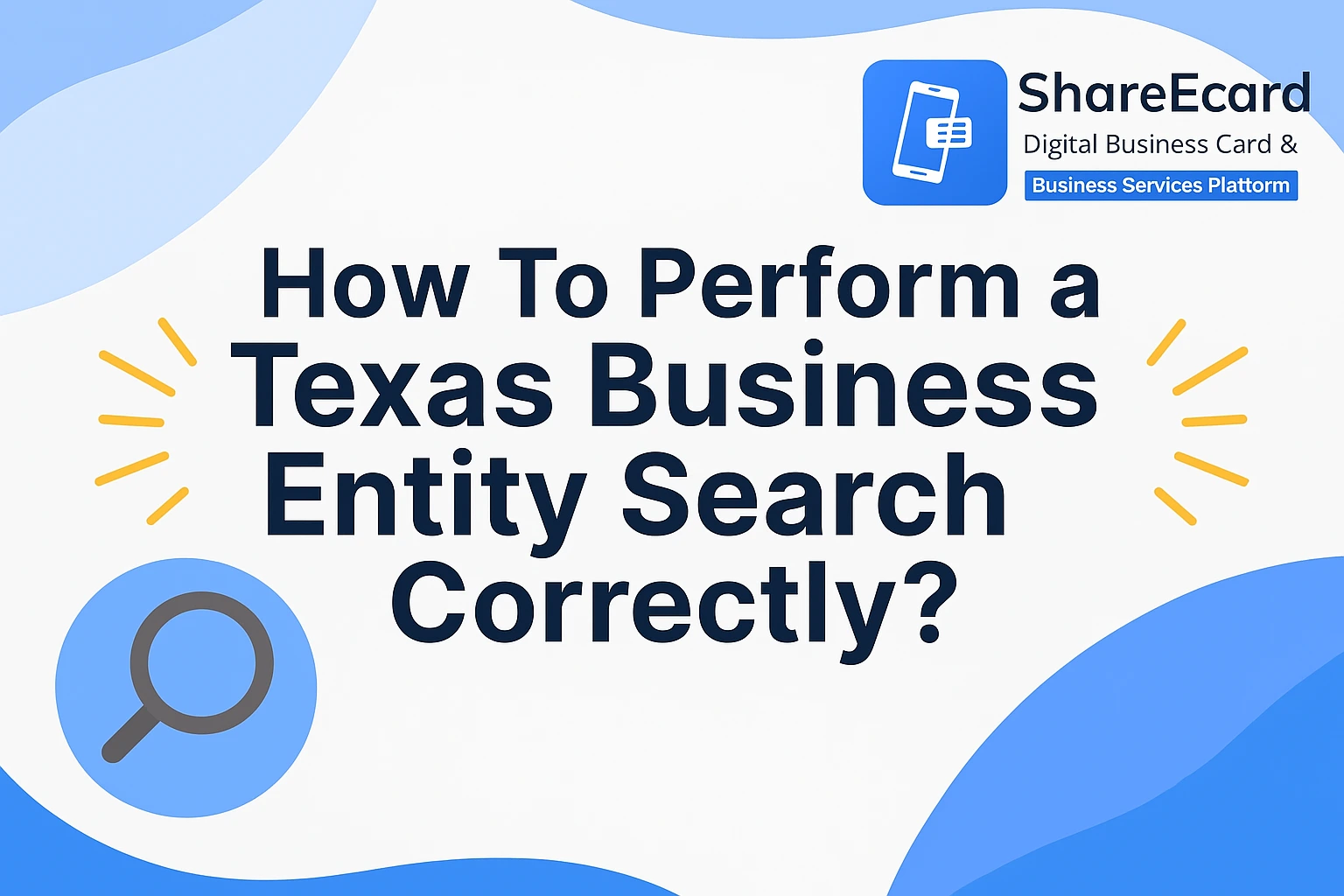Before you sign a contract, invest in a new partnership, or even start your own business in the Lone Star State, there’s one crucial step you should always take: performing a Texas Business Entity Search. This simple yet powerful tool, provided by the Texas Secretary of State, is your window into the official status and details of any business registered in Texas.
Whether you’re a budding entrepreneur checking if your dream business name is available, a cautious consumer verifying a company’s legitimacy, or a professional conducting due diligence, this guide will walk you through everything you need to know. We’ll cover how to use the search tool, what the results mean, and answer the most common questions Texans have about this essential process.
What is a Texas Business Entity Search?
A Texas Business Entity Search is an online lookup tool that allows you to access the public records of corporations, LLCs, LPs, and other business entities registered with the Texas Secretary of State. Think of it as a business directory on steroids. It doesn’t just give you a name and address; it provides vital information about a company’s legal standing.
You can use this search to find information such as:
- The legal business name and any assumed names (DBAs).
- The entity’s formation date and state of formation.
- Its current status (e.g., in existence, forfeited, merged).
- The registered agent’s name and address.
- The office address of the entity.
Why Should You Perform a Texas Business Search?
Conducting a business search Texas isn’t just for lawyers and accountants. It’s a due diligence step that can save you time, money, and legal headaches.
1. To Verify a Company’s Legitimacy: Before doing business with a new vendor or client, a quick Texas entity search can confirm they are a legally recognized and active entity. This helps protect you from scams and fraudulent operations.
2. To Check Business Name Availability: This is one of the most common reasons for new business owners. Before you file formation documents, you must ensure your desired business name search Texas is unique and available for use. The search tool will show you all similarly named entities, helping you avoid rejection and potential trademark disputes.
3. For Due Diligence and Research: If you’re considering investing in a company, entering a partnership, or acquiring another business, a Texas corporation search or Texas company search is a fundamental part of your research. It reveals the company’s history and legal standing.
4. To Find a Company’s Registered Agent: The registered agent is the official point of contact for legal documents. If you need to serve legal papers, you can find the agent’s name and address through a Texas registered agent search within the database.
Step-by-Step Guide to Performing Your Texas SOS Business Search
Performing a Texas Business Entity Search is a straightforward process. Here’s a step-by-step guide to help you navigate the official state database.
Step 1: Go to the Official Website
Navigate to the Texas Secretary of State’s SOS Direct website. You can find it by searching “Texas Secretary of State SOSDirect” in your browser.
Step 2: Access the Search Tool
On the SOSDirect homepage, look for the section titled “Business & Nonprofit Entities” and select the link that says “Search Business Entities.” This will take you to the main search portal.
Step 3: Choose Your Search Method and Enter Criteria
You will see several search options. The most common are:
- Entity Name: Use this to search by the business’s legal or assumed name. You don’t need to type the full name; keywords work well.
- File Number: If you have the state-assigned file number, this is the most precise way to search.
- Officer Name/Registered Agent Name: You can search for all businesses associated with a specific individual.
For a standard Texas entity lookup, use the “Entity Name” tab. Enter the name of the business you are researching.
Step 4: Review the List of Results
After clicking “Search,” the system will generate a list of all entities that match your criteria. The list will show the entity name, file number, and state of formation. Scan the list to find the specific business you’re looking for.
Step 5: View the Detailed Filing Information
Click on the specific business name you’re interested in. This will take you to the detailed “Filing Information” page, which contains the most important data about the company.
What Information Will I Find in the Search Results?
When you perform a Texas corp search or LLC lookup, the results page provides a wealth of information. Here’s a breakdown of what you’ll see and what it means:
- Entity Name: The official legal name of the business as it is registered.
- File Number: A unique identification number assigned by the state.
- State of Formation: For entities formed outside of Texas, this will list their domestic state (e.g., Delaware). For Texas entities, it will say “Texas.”
- Entity Type: This tells you if the business is an LLC, Corporation, Limited Partnership, etc.
- Entity Status: This is critical. “In Existence” means it’s active and in good standing. Statuses like “Forfeited” or “Terminated” indicate the entity is no longer in good standing or has been dissolved.
- Registered Agent Information: The name and physical address of the registered agent in Texas. This must be a physical street address in Texas, not a P.O. Box.
- Registered Office Address: This is often the same as the registered agent’s address.
- Principal Office Address: The main business address of the company.
- Officers/Directors/Managers: For corporations and LLCs, this section lists the names and addresses of the key people running the company.
What’s the Difference Between a Texas Corporation Search and a Texas LLC Search?
The Texas Business Entity Search tool is a one-stop shop. Whether you’re looking for a Texas corporation search or a Texas LLC search, you use the same database and the same process. The tool does not differentiate by entity type in the initial search bar.
You simply type the name of the business you’re looking for. Once you land on the detailed results page, the “Entity Type” field will tell you whether it’s a corporation (e.g., “For-Profit Corporation”) or a limited liability company (“Limited Liability Company”).
How Do I Perform a Texas SOS Business Search for a Specific Secretary of State Number?
If you have a specific filing number from the Texas Secretary of State, your search becomes even more precise. On the main search page, instead of using the “Entity Name” tab, you can select the “File Number” tab. Enter the unique file number, and the search will take you directly to that entity’s detailed page, bypassing the list of results altogether. This is especially useful for professionals who handle multiple entity files.
What If I Need to Find a Texas Nonprofit?
The Texas Business Entity Search tool also includes nonprofit corporations. The process is identical. When you search for a nonprofit, its “Entity Type” will be listed as “Nonprofit Corporation.” The information displayed will be similar, including its registered agent and status.
FAQs
Q: Is the Texas Business Entity Search free to use?
No. While many states offer a free basic business search, the official Texas Secretary of State SOSDirect system charges a small fee (usually around $1) for each detailed report you view. This fee helps maintain the state’s online infrastructure.
Q: What is a Texas Registered Agent, and why is their information public?
A Texas registered agent is a person or company designated to receive official legal and tax documents on behalf of the business. This includes service of process for lawsuits. The information is public to ensure the state and legal system have a reliable way to contact the business.
Q: The entity status says “Forfeited.” What does that mean?
A “Forfeited” status means the entity has lost its right to conduct business in Texas, typically for failing to file its required periodic reports or pay associated fees. It is not in good standing and may be in the process of being administratively dissolved.
Q: Can I use the Texas Business Entity Search to file my formation documents?
No, the search tool is for looking up existing entities only. To form a new LLC or corporation, you will need to file a separate formation document (like a Certificate of Formation) through the SOSDirect system, which is a separate process with its own fees.
Q: How often is the information in the Texas entity search updated?
The database is updated in real-time as the Secretary of State processes filings. However, there can be a short processing delay of a few days between when a document is submitted and when it appears in the public record.
Q: I found a company, but I need a formal document to prove its status. Can I get that online?
Yes. Through the SOSDirect system, you can order a Certificate of Fact or Certificate of Existence for a fee. This is an official state document that verifies the entity’s legal status and is often required for opening business bank accounts or obtaining loans.




